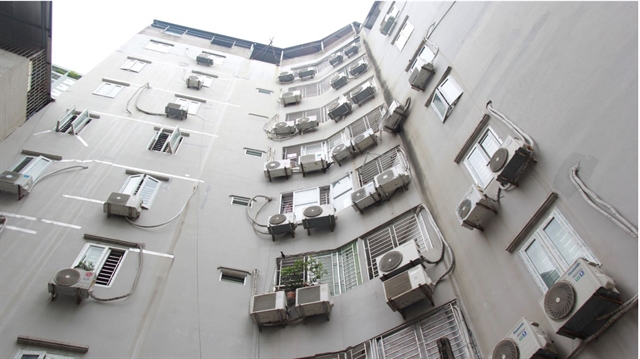 Society
Society


|
| A mini apartment block in Hà Nội. — VNA/VNS Photo |
HÀ NỘI — It's essential to control the small, multi-storey, and multi-apartment housing types owned by individuals, commonly referred to as mini apartment blocks, to reduce the risk of fires and explosions.
When obtaining construction permits, these mini apartment blocks are categorised as individual properties, exempting them from the pre-and post-construction inspection procedures mandated by the Department of Construction for standard apartment buildings.
This situation serves as a stark warning, requiring immediate and decisive action from management agencies to effectively avert fires and explosions, thereby safeguarding the safety, health, and property of the public.
Hoàng Văn Cường, a member of the National Assembly (NA) Finance and Budget Committee, highlighted that no current laws specifically regulate "mini apartment blocks.”
This is a "loophole" in the law, Cường said.
"First, the responsibility belongs to the investors for the construction and operation of ‘mini apartments’, then to the State management agencies approving housing projects,” said Cường.
“Agencies need to review current ‘mini-apartments’ which do not meet standards to request investors to repair and build escape routes, and places for entertainment and public activities," he said.
NA Chairman Vương Đình Huệ, in a recent meeting of the National Assembly Standing Committee, stated clearly: "Definitely do not legalise 'mini apartments' in the Housing Law."
At the same time, he assigned the NA Law Committee to review the amended Housing Law to ensure this type of housing is not legalised.
In recent years, there has been ambiguity and a lack of clarity about the legal nature of "mini apartments".
The question arises: Is this a single house or an apartment block?
With current regulations, if a household has a plot of land of several hundred square metres, the owner only needs to apply for a construction permit for a regular individual house. And the licensing authority is the district People's Committee, taking about two months.
Meanwhile, a real estate business wanting to invest in and trade apartment products must establish a project and carry out investment procedures according to the Investment Law, Land Law, Housing Law, and Real Estate Law, along with completing several procedures of approval of investment policy, land allocation, land lease, land valuation and implementation of land financial obligations, feasibility study report appraisal, basic design, approval of fire prevention and fighting, issuance of construction permits, acceptance of fire protection, and acceptance of works eligible for operation by competent authorities.
In fact, an apartment project usually takes at least two years to complete legal procedures.
The "unfair competition" in legal procedures leads to households investing in "mini apartments" having an advantage over real estate businesses.
After the "mini apartment" fire in Hà Nội’s Thanh Xuân District in September, which claimed the lives of 56 people and injured 37, many believed that it is necessary to tighten the management of small multi-storey and multi-apartment housing.
Chairman of the NA Law Committee Hoàng Thanh Tùng said that the committee has received many comments suggesting the need for stricter regulations on the development, management, and use of multi-storey and multi-apartment housing by individuals, especially requirements on construction standards and fire prevention.
To overcome shortcomings, the NA Law Committee proposed to revise Article 57 of the draft amended Housing Law more strictly, Tùng said.
In particular, multi-storey houses and multi-apartment buildings owned by individuals must comply with construction standards set by the Minister of Construction if they have two or more floors and fewer than 20 apartments for rent. These buildings must be designed with a fire protection system approved by competent authorities, and their owners are required to implement proper management measures for fire prevention.
If an individual builds a house with two floors or more and 20 apartments for sale or rent, they must establish a business, set up an investment project, and qualify as an investor in a housing construction investment project.
NA Deputy Hoàng Đức Thắng expressed concern that overly stringent management could force poor workers and students onto the streets if they cannot afford apartments that meet high standards. He noted that despite the Government's efforts to design policies supporting social housing investment, few businesses are interested and potential buyers find it difficult to access due to high prices and cumbersome procedures.
NA Deputy Lê Thị Lịch highlighted the importance of providing low-income people with housing while maintaining strict management of infrastructure construction and urban housing management for houses, dormitories, and mini apartment blocks. She observed that most rental facilities do not meet fire prevention standards, calling for stricter management regulations and amendments to the Law.
Deputy Nguyễn Thị Thuý emphasised that while the demand for social housing needs to be met, "mini apartments" should not be legalised in the Housing Law. She urged the Government to continue implementing preferential solutions to increase the supply of social and affordable commercial housing and to inspect "mini apartments" for violations, guiding investors to implement necessary fire and explosion prevention and safety measures. — VNS




